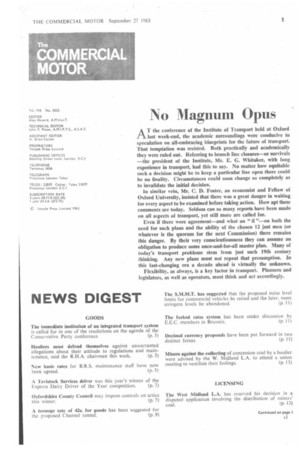No Magnum Opus
Page 5

If you've noticed an error in this article please click here to report it so we can fix it.
T the conference of the Institute of Transport held at Oxford last week-end, the academic surroundings were conducive to speculation on all-embracing blueprints for the future of transport. That temptation was resisted. Both practically and academically they were ruled out. Referring to branch line closures—or survivals —the president of the Institute, Mr. E. G. Whitaker, with long experience in transport, had this to say. No matter how equitable such a decision might be to keep a particular line open there could be no finality. Circumstances could soon change so completely as to invalidate the initial decision.
In similar vein, Mr. C. D. Foster, an economist and Fellow of Oxford University, insisted that there was a great danger in waiting for every aspect to be examined before taking action. How apt these comments are today. Seldom can so many reports have been made on all aspects of transport, yet still more are called for.
Even if there were agreement—and what an "it "—on both the need for such plans and the ability of the chosen 12 just men (or whatever is the quorum for the next Commission) there remains this danger. By their very conscientiousness they can assume an obligation to produce some once-and-for-all master plan. Many of today's transport problems stem from just such 19th century thinking. Any new plans must not repeat that presumption. In this fast-changing era a decade ahead is virtually the unknown.
Flexibility, as always, is a key factor in transport. Planners and legislators, as well as operators, must think and act accordingly.






















































































































